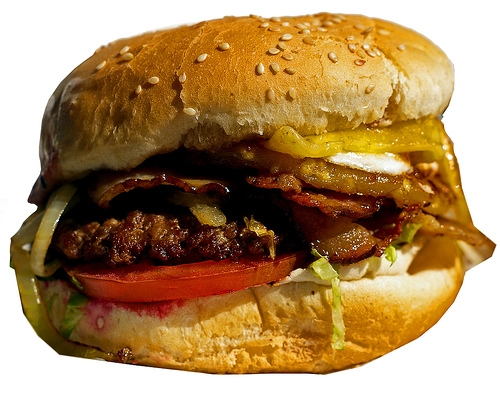I have written about the link between wages and obesity before — with wages dropping since the 60s and healthy food prices always going up, people eat more unhealthy food. But now two economists have drilled down into these issues and claim to have found a specific link between a drop in the minimum wage and obesity:
Growing consumption of increasingly less expensive food, and especially “fast food”, has been cited as a potential cause of increasing rate of obesity in the United States over the past several decades. Because the real minimum wage in the United States has declined by as much as half over 1968-2007 and because minimum wage labor is a major contributor to the cost of food away from home we hypothesized that changes in the minimum wage would be associated with changes in bodyweight over this period. To examine this, we use data from the Behavioral Risk Factor Surveillance System from 1984-2006 to test whether variation in the real minimum wage was associated with changes in body mass index (BMI). We also examine whether this association varied by gender, education, and income, and used quantile regression to test whether the association varied over the BMI distribution. We also estimate the fraction of the increase in BMI since 1970 attributable to minimum wage declines. We find that a $1 decrease in the real minimum wage was associated with a 0.06 increase in BMI. This relationship was significant across gender and income groups and largest among the highest percentiles of the BMI distribution. Real minimum wage decreases can explain 10 percent of the change in BMI since 1970.
Secure · Tax deductible · Takes 45 SecondsSecure · Tax deductible · Takes 45 Seconds
 Photo courtesy Vanessa Pike-Russell via Flickr Fast food companies have a long history of fighting things like unionization drives and minimum wage increases — indeed, they are often leading the charge. It’s clearly been good for their bottom lines and now this study shows how it’s been bad for our waistlines. The study authors focused on food eaten outside the home since labor costs are a significant component of total costs for fast food (unlike for processed foods) and such food has been a significant source of additional calories in our diets.
Photo courtesy Vanessa Pike-Russell via Flickr Fast food companies have a long history of fighting things like unionization drives and minimum wage increases — indeed, they are often leading the charge. It’s clearly been good for their bottom lines and now this study shows how it’s been bad for our waistlines. The study authors focused on food eaten outside the home since labor costs are a significant component of total costs for fast food (unlike for processed foods) and such food has been a significant source of additional calories in our diets.
Anyway, one interesting component of the study was that the BMI effect regarding the minimum wage were more pronounced among high income earners rather than among low income earners. The study’s authors speculate that this is because low income earners don’t eat nearly as much food outside the home. The authors also found something interesting in that regard:
[E]ven though lower income persons are more likely than higher income persons to be obese, obesity has increased most among higher income persons in recent years, as might be expected if changes in the price of food away from home were driving increases in obesity.
In other words, the more you make, the more calories you’re getting from fast food, which has in turn gotten cheaper thanks to a falling real minimum wage which has thus caused you to eat even more fast food. Your vicious circle is McDonald’s virtuous one.
Keep in mind, the minimum wage effect is relatively small, only 10 percent of the overall increase in obesity since 1970. Unfortunately, the authors also point out that simply raising the minimum wage can’t necessarily be considered an obesity “cure” since other productivity improvements among fast food companies, especially in recent years, may dilute the minimum wage’s impact going forward.
Still, it’s worth marveling at the fact that the minimum wage was — measured in 2007 dollars — $9.15 in 1968 and dropped to around $5.80 in 2007, so perhaps a few more raises are in order. If you’re wondering why a living wage went the way of the Princess Phone, just ask McDonald’s.
h/t Free Exchange



